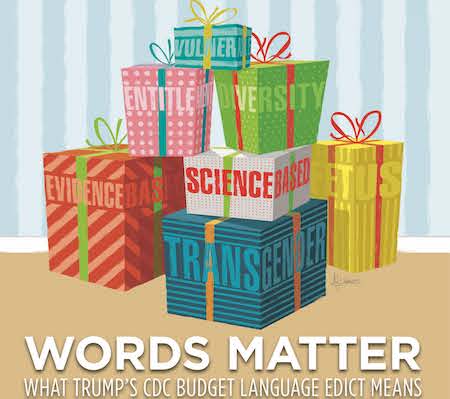
BY PAUL SCHINDLER | As with so many revelations about the Trump administration, the storm over seven words that staff members at the federal Centers for Disease Control and Prevention (CDC) were warned last week not to include in budget proposals began with an unsettling news report, followed by a bewildering, nontransparent mix of official pushback, denials, and non-denials. At the end of it all, we can’t avoid the conclusion that the alarm occasioned by the initial reporting was by and large justified.
The Washington Post on December 15 reported, “The Trump administration is prohibiting officials at the nation’s top public health agency from using a list of seven words or phrases — including ‘fetus’ and ‘transgender’ — in official documents being prepared for next year’s budget.”
LETTER FROM THE EDITOR: EXPRESS OURSELVES
CDC policy analysts told the Post that in a 90-minute meeting the day before senior officials “responsible for the budget” advised experts — whose careers are about actually battling to protect the public’s health — that the following words or phrases should not be used in any budget documents:
- Transgender
- Fetus
- Diversity
- Vulnerable
- Entitlement
- Science-based
- Evidence-based
The following day, the Post reported that other agencies that, like the CDC, report to the Department of Health and Human Services (HHS) had recently received similar directives.
One telling detail in the Post’s reporting was that CDC staff were advised that in lieu of using the phrases “science-based” and “evidence-based,” they might instead say, “CDC bases its recommendations on science in consideration with community standards and wishes,” a construction suggesting that facts must be mediated through a political strainer to remove unpopular, uncomfortable, or inconvenient truths.
So for example, we might imagine scenarios where for people — and polluting industries — who don’t want to hear that climate change is caused by human activity, our government instead says that there are many studies, and they suggest a wide array of explanations for the increasingly volatile weather patterns. Or if people refuse to accept that sexual orientation is an immutable characteristic rather than a chosen lifestyle, the government talks about how complicated it is to come to any definitive conclusions about what “causes” people to act homosexually.
Officials at HHS immediately pushed back against the conclusions many Post readers rushed online to talk about, with its spokesperson, Matt Lloyd, telling the newspaper that the department “will continue to use the best scientific evidence available to improve the health of all Americans. HHS also strongly encourages the use of outcome and evidence data in program evaluations and budget decisions.”
For a December 16 story, Lloyd told the New York Times, “The assertion that HHS has ‘banned words’ is a complete mischaracterization of discussions regarding the budget formulation process.”
Other, unnamed officials told the Times that the directive to the CDC policy analysts was, in the newspaper’s formulation, “not so much a ban on words but recommendations to avoid some language to ease the path toward budget approval by Republicans.”
Still, nobody, at HHS or elsewhere, denied the substance of the Post’s reporting, and the Times’ sources confirmed the essentials of the initial Post story.
Science Magazine, in fact, documented how resistance to the seven words had already taken hold in the first Trump budget request laid out early this year. The word “transgender” appeared 10 times in the CDC’s final budget request under President Barack Obama, but only once in the first Trump proposal. “Evidence-based” declined from 125 instances under Obama to 38 under Trump. “Diversity” declined from 10 instances to two, while “vulnerable” fell from 24 to nine.
LGBTQ, pro-choice, and other social justice advocates are right to be alarmed. In a press teleconference on December 19, Mara Keisling, executive director of the National Center for Transgender Equality (NCTE), said the argument that the discussion about the seven words was only a political expediency focused on the budgeting process ignores the inescapable link between what gets funded in the budget and what policy and scientific issues researchers and other experts spend their time on.
“There’s no reason to think that the ban is limited to the budget, other than that’s all that was brought up at the meeting,” Keisling said. “Even if it is just limited to the budget, that is catastrophic for public health, catastrophic for trans people… It would be a weird world, indeed, where people were not allowed to talk about things in the budget process but were then allowed to do studies and do good public health about those topics.”
Noting that across the board, transgender Americans have worse access to quality care, including primary care physicians, and experience worse health outcomes, including higher rates of HIV infection and lower rates of connection to care, Keisling said, “If public health does not look at transgender people, it is putting trans people and all people at risk… Layering political decisions over public health is not a good public health system and it will cause death.”
The administration’s obfuscation about what it is and isn’t doing regarding the seven words at issue and any other words or lines of scientific inquiry, she added, imperils another pillar of good public health policy — public trust.
“It is horrifying that this administration would add incredibility onto the system, holding a meeting with scientists and then denying it… People have reason to believe they are not hearing the truth from the CDC, and that will cause death.”
On the same call, Gretchen Goldman, the research director for the Center for Science and Democracy at the Union of Concerned Scientists, explaining she has studied “scientific integrity” for years, said, “I can tell you the CDC is a scientific institution.” Warnings about how the use of bureaucratically forbidden words will affect their funding, however, compromises integrity.
“Scientists shouldn’t be scared that their work won’t be funded because political appointees don’t like science,” she said.
Shannon Minter, the legal director at the National Center for Lesbian Rights, warned that the CDC directive risked “effectively eras[ing] transgender individuals” in health policymaking and ominously pointed to the staggering consequences of AIDS’ invisibility during the Reagan administration. Erica Sackin, Planned Parenthood’s director of political communication, noted that it would be impossible for the nation to have effectively responded to the Zika virus outbreak without using the word fetus.
Since Trump took office, the LGBTQ community has been fighting efforts to make our community less visible in the government arena. Though the Census Bureau’s original plan to drop any questions related to sexual orientation in 2020 was beat back, SAGE has been in an extended battle to keep questions about sexual orientation and gender identity in several major surveys conducted annually of the nation’s elder population. As SAGE and NCTE and any other health, housing, or social service advocacy group knows well, if a community cannot document its existence, it cannot demonstrate its needs, and as a result money to address those needs will never materialize.
NCLR’s Minter put his finger on a more fundamental concern raised by the controversy over banned words.
“We have been given a very clear warning,” he said. “What happened was really extraordinary. It is right out of the textbook in terms of authoritarianism.”
Strongmen leaders in the modern age have learned how control of information and language are key to maintaining power, and Donald Trump’s extraordinarily inflammatory showmanship has allowed him to finesse difficult hurdles he’s faced with simplistic nostrums. He daily does damage to the credibility of hard-working news organizations with his habitual wielding of “fake news” charges, confusing public discourse to the point where a weary public shrugs its shoulders and concludes there is no discernible truth to be found.
The effort to disqualify facts and scientific evidence and to erase certain communities and constituencies poses a danger to the foundations of democracy itself. Transgender people are obviously at risk, as is women’s health. Communities of color are clearly the political targets in the elimination of the words “diversity” and “vulnerability.” But if politicians dictate what words scientists and other researchers can use and what questions they can pursue, there is potentially no limit to how those in power can harness the expertise of those on the ground whose purse strings they control.






































